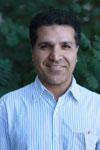St. Thomas More College faculty have a growing record of research success. Our faculty have received funding from granting agencies that include the Canadian Institutes for Health Research (CIHR), the Saskatchewan Health Research Foundation (SHRF), the Chiang Ching-kuo Foundation, the Alzheimer Society of Canada, and the Social Sciences and Humanities Research Council of Canada (SSHRC). Since 2014, over 25% of our full-time faculty have held Tri-Agency grants (CIHR, NSERC, or SSHRC).
Grant Winners
Saeed Moshiri (Economics)
 Principal Investigator, Firms’ Performance in a Natural Resource-based Economy
Principal Investigator, Firms’ Performance in a Natural Resource-based Economy
Co-applicants: Wessel Vermeulen, Newcastle University London; Gry Østenstad, University College of Southeast Norway
Productivity Partnership Program grant (funded by SSHRC)
The purpose of this project is to study the development and behaviour of firms that operate in an economy that is largely based on natural resources. The current literature states commodity pricing fluctuations due to rises in the exchange rate and/or wage levels may serve to negatively impact a natural resource-based economy. This may especially be the case for manufacturing firms that export. Due to data limitations, research in this area is limited in both the international and Canadian context. The main question this paper seeks to answer is: how are Canadian firms’ sales, levels of employment, wage costs, and export sales affected by a natural resource windfall. Such information is relevant for policy makers as it will provide insight on how to support exporting firms that are negatively affected by the volatility of natural resources.
Co-investigator, Production of fuel pellets from agricultural residues as bio-coal for conversion to biofuels using gasification and combustion
Principal Investigator, Ajay K. Dalai, College of Engineering, Department of Chemical and Biological Engineering, University of Saskatchewan
Agriculture Development Fund, Government of Saskatchewan
This project will study production of hydrophobic fuel pellets from agricultural residues as bio-coal for conversion to biofuels through gasification and combustion technologies.
Jeongeun Park (Religion and Culture)
 Co-Investigator, The Layers of Korean Buddhism: Dynamics of its Ideals and Practice in Chosŏn and Colonial Korea
Co-Investigator, The Layers of Korean Buddhism: Dynamics of its Ideals and Practice in Chosŏn and Colonial Korea
Principal Investigator: Dr. Nam-lin Hur, Department of Asian Studies, University of British Columbia
Co-Investigator: Dr. Sung-Eun Thomas Kim, Dongguk University (South Korea)
AKS (Academy of Korean Studies) Laboratory Program Grant for Korean Studies, 2022-2025
Buddhism created challenges to the societal status quo and, thus, assisted the diversification and vitalization of society and culture in Chosŏn/Colonial Korea. Buddhism aided this by relativizing the realms of ideals vis-à-vis practice, and the center vis-à-vis the periphery, which fundamentally challenged and shifted societal conventionalism and traditionalism. The monastics were in search of alternative solutions to the emerging socio-historical issues and in an effort to fulfill the new desires of the people. This project will explore the dynamics of ideals and practice that unfolded in Korean Buddhism including the changes surrounding monastic families and clerical marriage, challenging prevailing assumptions about matters of monastic code.
Sharon Wright (History)
 Co-Principal Investigator, Female Magic Practitioners 1350 – 1550
Co-Principal Investigator, Female Magic Practitioners 1350 – 1550
Co-PI: Frank Klaassen, Department of History, University of Saskatchewan
SSHRC Insight Grant, 2022-2027
Despite popular representations of witches, real female magic practitioners were rarely accused of witchcraft. In the Essex witch trials during the reign of Queen Elizabeth I, for example, only three percent of those accused were actually magic practitioners. These practitioners were more commonly understood as protections from witchcraft.
This project will include a close study of late medieval ecclesiastical courts in England, focused studies on known female practitioners, and a broad-based comparative survey of female practitioners in Western and Central Europe. Who were these women? What sorts of things did they do? How did they compare to male practitioners? And how and when did the church seek to regulate their activities? (From the USask news article)
Daniel Regnier (Philosophy)
 Music, Soul, Science and Creativity: From Aristoxenus to al-Fârâbî
Music, Soul, Science and Creativity: From Aristoxenus to al-Fârâbî
Co-PI: Mark Nyvlt, Dominican University College
SSHRC Insight Grant, 2021-2024 (extended to 2026)
Why was it that in Ancient Greece and in the Medieval Islamic world the most detailed, voluminous, and important works on music were written by philosophers? Aristoxenus (fl. 335 BCE) – a direct student of Aristotle – and al-Fārābī (872-950 CE) – referred to by the Arabs as the ‘second teacher’ (i.e. after Aristotle) – both believed that music had an important place in philosophy. This project examines the works on music by the philosophers Aristoxenus and al-Fârâbî with a view to providing a compelling account of how Aristotelian science accounts for philosophy of music. It focuses on two major themes: 1) the relationship between music and science and 2) the relationship between music and the soul. Both Aristoxenus and al-Fârâbî are critical of Pythagorean approaches to music and make a large place for perception, emotion and creativity in their accounts of the philosophy of music.
Paulette Hunter, Ph.D., R.D. Psych., (Psychology)
 Strengthening a Palliative Approach to Long-Term Care
Strengthening a Palliative Approach to Long-Term Care
The average long-term care (LTC) resident in Canada is within 18 months of end of life at the time of admission, suggesting an emergent need for a palliative approach to care. Dr. Paulette Hunter is co-principal investigator on a national team that is working to introduce a new care framework called strengthening a palliative approach to long-term care (SPA-LTC). Through SPA-LTC, the team is making a concerted effort to improve palliative care in long-term care in a way that respects the realities of today's LTC context. Team members include nominated Principal Investigators Dr. Sharon Kaasalainen (McMaster University) and Dr. Tamara Sussman (McGill University), as well as Co-Principal Investigators Dr. Lynn McCleary (Brock University), Dr. Genevieve Thompson (University of Manitoba), Dr. Lorraine Venturato (University of Alberta), and Dr. Abigail Wickson Griffiths (University of Regina). The team recently received a $948,600 Canadian Institutes of Health Research grant (2019-2024) to scale up the SPA-LTC framework in three Canadian provinces, including Saskatchewan.
Charles Smith (Political Studies)
 Free to Express Yourself Off-Duty?: Workplace Discipline in the Age of Social Media
Free to Express Yourself Off-Duty?: Workplace Discipline in the Age of Social Media
Co-PI: Daniel Paré, University of Ottawa
SSHRC Insight Development Grant, 2018-2020
This project examines the balance between employer monitoring of social media platforms and the freedom of expression of individuals on these platforms. In an age when social media platforms offer myriad opportunities for amplifying individual expression, the relationship between employees’ experiences at work and their ability to publicly express their voice without fear of reprisal constitutes an important public policy and human rights issue. At the centre of our project is the following research question: How are the discursive and dissemination opportunities afforded by social media platforms altering the balance between citizens’ public rights to freedom of expression and their private contractual obligations as employees? Our research focuses on Canada’s employment law and its governance trajectory and will result in an online database of these governance decisions that will provide users with a broader understanding of employer/employee rights around social media use.
Jennifer Briere, M.Ed., Ph.D. (Psychology)
 Co-Investigator, Addressing Loneliness and Social Isolation: Building Bridges in Seniors' Housing
Co-Investigator, Addressing Loneliness and Social Isolation: Building Bridges in Seniors' Housing
Principal Investigator: Dr. Donna Goodridge, University of Saskatchewan
Co-Investigator: Kerstin Roger, University of Manitoba
Collaborators: J. Dziad; K. Hails; W. Hails; J. Lidington; J. Newman; E. PausJenssen; I. Poulin; K. Roger; and C. Skrapek
CIHR Catalyst Grant: Patient Oriented Research, 2020-2021 (extended to 2022)
By 2030, Canadians aged 65 and older will constitute 23% of the population. Because of the increase in one-person households and the geographic dispersion of families, loneliness and social isolation may be more common for older adults now than in the past. USask researcher, Dr. Donna Goodridge, and STM researcher Dr. Jennifer Briere, along with their team of researchers, will survey residents of two seniors’ social housing sites in. The results of the survey will be used to evaluate patterns of loneliness and social isolation among residents and draw out perceptions and priorities for addressing these issues. The research team plans to create a scalable and evidence-based program that can be used in other seniors’ social housing settings across Canada.
Carie Buchanan (Psychology)
 Evaluating Prosocial Bystander Intervention Training with Undergraduate Students in Preventing Sexual Assaults
Evaluating Prosocial Bystander Intervention Training with Undergraduate Students in Preventing Sexual Assaults
Co-PI: Karen Lawson, University of Saskatchewan
Collaborator: Donald McCreary, Brock University
SSHRC Insight Development Grant, 2019-2021
The proposed study will examine the effectiveness of bystander intervention training with university students in preventing sexual violence using a developmental intergroup theoretical framework. A developmental intergroup approach could help explain how peer interactions and social norms relating to gender socialization improve or impede recognition of opportunities to intervene and willingness to intervene as bystanders. Grounding this evaluation research in theory will better facilitate the transfer of effective bystander intervention training across student bodies within and across institutions. This research will be used to inform changes made to the bystander intervention training offered to students to improve efficacy and promote positive change in students' social norms that may support sexual violence. The proposed research will ensure that bystander intervention training offered to students at the U of S is highly effective given programmatic decisions regarding the program will be evidence-based. Equipping students with knowledge and skills in recognizing and safely intervening in situations wherein sexual violence is occurring or may occur will help make campus safer.
Sarah Knudson (Sociology)
 Experiences of disability and intimate relationship formation in modestly and under-resourced communities
Experiences of disability and intimate relationship formation in modestly and under-resourced communities
SSHRC Insight Development Grant, 2019-2021
Historically and cross-culturally, persons with disabilities (PWDs) have been stigmatized, excluded from many aspects of social life, and written off as asexual and undesirable in intimate contexts. Meanwhile, in legal and public policy realms, there has been growing recognition of the full personhood of individuals with disabilities of all sorts. This recognition has included increased attention to PWDs’ right to make their own choices, participate fully in the life of their community, and engage in intimate relationships that are satisfying, safe, and pleasurable. This project will expand knowledge of the socio-spatial dimensions of disabled persons’ intimate lives through interviews and focus groups with adult PWDs in Saskatoon and Prince Albert. This research will give voice to their experiences: the challenges PWDs face as they seek and form intimate relationships, what supports they turn to, and how families, caregivers, communities, and social services might better support them in seeking and sustaining intimate relationships. This project will bring PWDs’ experiences, needs, and requests for support to the fore at a critical time when the Canadian government appears poised to listen and respond, and when nearly 15% of Canadian adults report living with disabilities that cause limitations to daily activities.
Zachary Yuzwa (History)
 Old Words, New World: Reading the Past and Writing the Other in the Latin Literature of New France
Old Words, New World: Reading the Past and Writing the Other in the Latin Literature of New France
SSHRC Insight Development Grant, 2018-2020
Jesuit missionaries in early Canada produced a monumental corpus of literature that is invaluable for the study of the earliest contacts between Europeans and the indigenous communities they encountered in the New World. This project seeks to address a lacuna in the study of this corpus of Latin literature. I argue that these texts write a world-changing cultural encounter not simply as a reflection of actual events, nor exclusively through the prism of contemporary concerns but also in light of an ancient tradition of Latin literature. I focus on Phillipe Pierson’s De Religione as a case study. This text survives in an eighteenth-century bilingual manuscript written both in Wendat (a Northern Iroquoian language spoken by the Wendat people, sometimes called the Huron) and in Latin. Through this text I consider questions of the opposing impulses of colonization and integration; what it means to employ a language of empire (Latin) at the very periphery of European influence; and how Latin was used to construct identity and difference in the Jesuit’s missionary work in New France.
Saeed Moshiri (Economics)
 Natural and Renewable Resources in the Canadian Economy
Natural and Renewable Resources in the Canadian Economy
From 2016-2019 Professor Moshiri was Co-Investigator on "Investigation and demonstration of close coupled gasification of novel fuel pellets developed from agricultural residues," funded by the Agricultural Development Fund (ADF) and contributions from industry. The project aimed to develop technical and economical methods for utilizing the agricultural wastes and forest residues as renewable and sustainable energy resources to help reduce carbon emissions. Team members included Principal investigator Dr. Ajay Dalai (University of Saskatchewan), Co-Investigators Dr. Janusz Kozinski (York University and University of Saskatchewan), and Dr. Chithra Karunakaran (University of Saskatchewan).
From 2018-2019 he was Principal Investigator on “Firm’s Performance in a Natural Resource Based Economy, Evidence from Canadian Plants,” which was funded by a SSHRC Partnership Development Grant through the Productivity Partnership Program. The project researched the development and behavior of firms that operate in an economy affected by natural resource development and exploitation. It focused on the impact of oil windfalls on various indicators of firms’ performance, such as sales, output, exports, and productivity. His team included Co-Investigators Gry Østenstad (University College of Southeast Norway), Wessel Vermeulen (Newcastle University), and Rresearch Assistant Roshanak Azarafshar (University of Ottawa).
Daniel Regnier (Philosophy)
 The Arabic Plotinus and its Reception in Arabic and Islamic Philosophy
The Arabic Plotinus and its Reception in Arabic and Islamic Philosophy
SSHRC Insight Development Grant, 2016-2018
In this project I examine a very important episode in the transmission of Greek Philosophy into Arabic and thus into the Islamic world. I focus my attention on the so-called Arabic Plotinus, a group of texts which are very heavily adapted ‘translations’ of parts of Plotinus’ work into Arabic. The largest part of the Arabic Plotinus circulated under the very misleading title ‘Theology of Aristotle’ and was an extremely important source for thinkers in the medieval Islamic world. Most modern scholarship has focused on the Arabic Plotinus as a source for metaphysical and theological doctrines. I argue, however, that the Arabic Plotinus, and in particular the Theology of Aristotle – which is based largely on the Plotinus’ psychological works – makes original contributions to psychology in a Neoplatonic paradigm and that philosophers of the Islamic world drew on the Arabic Plotinus in formulating their original contributions to thought concerning self and soul. The first phase of this project examines innovations in in psychology in the Arabic Plotinus while the second phase focuses on its reception by thinkers in the Islamic world, particularly in al-Farabi, Avicenna and Sohrawardi.
Tina Greenfield (Religion and Culture)
 Mobile Economies: A bioarchaeological approach to food economies and mobility in Southern Mesopotamia in the 3rd Millennium BC
Mobile Economies: A bioarchaeological approach to food economies and mobility in Southern Mesopotamia in the 3rd Millennium BC
Collaborators: Elizabeth Arnold, Grand Valley State University; Chris Holmden, University of Saskatchewan; Augusta McMahon, University of Cambridge; Cameron Petrie, University of Cambridge
SSHRC Insight Development Grant, 2019-2021
Ancient Mesopotamia provides evidence of the earliest cities, states and empires – with city-states coming to dominate the political landscape in the 3rd millennium BC. Cuneiform texts of the period record large herds of domestic animals that supplemented irrigation agriculture as the twin mainstays of the economy and diet. While the ancient textual archives are rich in documents recording actions of elite city-state citizens and large institutions, few systematic science-based studies of human and animal diets, mobility, herd management or other forms of human-animal interaction have been undertaken. Combining well-established zooarchaeological analyses with isotopic and trace element studies, this groundbreaking study will provide new insights and form the foundation for reconstruction of economic practices in mature cities in Southern Mesopotamia in the Early Dynastic period (2900-2334 BC). This project will provide important information on the larger issues of themes of food management strategies, mobility, economic flexibility, and environmental resilience not yet explored. Part of this project was also funded with a Research Grant from STM and a pilot study was funded by the University of Cambridge Humanities Research Grant Scheme.
